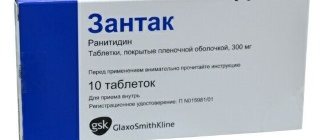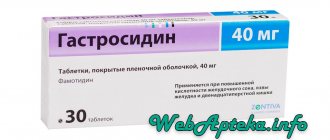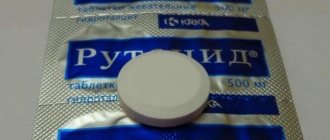Write a review
Reviews: 0
Manufacturers: Krka (Slovenia)
Active ingredients
- Sucralfate
Disease class
- Stomach ulcer
- Duodenal ulcer
Clinical and pharmacological group
- Not indicated. See instructions
Pharmacological action
- Antiulcer
Pharmacological group
- Gastroprotectors
Pharmacological properties of the drug Venter
A remedy for the treatment of peptic ulcers. Sucralfate protects the gastric mucosa without having a systemic effect and having virtually no effect on the acidity of gastric juice. Sucralfate binds to the proteins of necrotic tissue in the area of the ulcer, forming a protective coating that prevents the action of pepsin, hydrochloric acid of gastric juice and bile salts. Sucralfate reduces pepsin activity by approximately 30%. Accelerates the scarring of peptic ulcers of the stomach and duodenum, prevents their recurrence and the formation of stress ulcers, and also reduces the absorption of phosphates from the digestive tract. After oral administration, ≤5% of sucralfate is absorbed, as a result of which the drug has no systemic side effects. The absorbed part of the drug is excreted by the kidneys.
Side effects
During treatment with Venter, the following may develop: constipation , nausea , flatulence, vomiting , diarrhea , dry mouth, headache, drowsiness , dizziness, gastralgia , lower back pain, allergic reactions and so on.
Use of the drug Venter
Orally on an empty stomach 30–60 minutes before meals. The tablets can be swallowed whole with water, or, like the granules, dissolve them in 1/2 glass of water and drink the resulting solution. For peptic ulcers of the stomach or duodenum, 1 g is prescribed before each main meal (breakfast, lunch, dinner) and 1 g before bedtime. You can also prescribe 2 g 2 times a day. The duration of treatment should not exceed 12 weeks. If the symptoms of the disease disappear, the drug should be continued for another 4–8 weeks or until the result of an endoscopic examination confirms scarring of the ulcer. To prevent relapses of duodenal ulcers, 1 g is prescribed 2 times a day. Children over 4 years of age can be prescribed 0.5–1 g of sucralfate 4 times a day (1 hour before each main meal and before bedtime), that is, approximately 40–80 mg/kg body weight in 4 divided doses . There is no need for dose adjustment in patients with renal failure. There is a risk of aluminum accumulation in the body when using the drug in patients with chronic renal failure or in patients on dialysis.
Venter
Active substance:
Sucralfate*
Pharmgroup:
Gastroprotectors
Analogs for the active substance:Alsukral Ankrusal Sucralfate Sukrat Ulgastran | Application area:Ulcerogenic pancreatic adenoma Pain syndrome in duodenal ulcer Pain syndrome with gastric ulcer Pain syndrome in gastric and duodenal ulcers Pain syndrome in gastric and duodenal ulcers Inflammation of the gastric mucosa Inflammation of the gastrointestinal mucosa Gastrinoma Gastrinomas Nutritional hyperphosphatemia Benign gastric ulcer Disease of the stomach and duodenum associated with Helicobacter pylori Disease of the stomach and duodenum associated with Helicobacter pylori Zollinger-Ellison syndrome Exacerbation of gastroduodenitis against the background of peptic ulcer Exacerbation of peptic ulcer Exacerbation of peptic ulcer Exacerbation of duodenal ulcer Exacerbation of gastric ulcer Organic gastrointestinal disease Peptic ulcer of the stomach and duodenum Peptic ulcer of the stomach and duodenum Postoperative gastric ulcer Ulcer recurrence Recurrence of duodenal ulcer Familial hyperphosphatemia Symptomatic stomach ulcers Symptomatic ulcers of the stomach and duodenum Symptomatic ulcers of the stomach and duodenum Chronic inflammatory disease of the upper gastrointestinal tract associated with Helicobacter pylori Helicobacter pylori eradication Helicobacter pylori eradication Erosive and ulcerative lesions of the duodenum Erosive and ulcerative lesions of the duodenum associated with Helicobacter pylori Erosive and ulcerative lesions of the stomach Erosive lesions of the duodenum Erosive lesions of the stomach Erosion of the gastric mucosa Peptic ulcer Duodenal ulcer Stomach ulcer Gastric ulcer Ulcerative lesions of the duodenum Ulcerative lesions of the stomach Helicobacter pylori |
Special instructions for the use of the drug Venter
The small amount of aluminum contained in sucralfate is absorbed in the digestive tract and subsequently excreted in the urine. In case of severe renal dysfunction, aluminum may accumulate in the body with the development of its toxic effect. The risk of accumulation increases with simultaneous administration of other drugs containing aluminum (for example, some antacids). The safety and effectiveness of sucralfate in children under 4 years of age have not been sufficiently studied, so it is not recommended to prescribe the drug to children in this age group. The drug can be used during pregnancy only when the expected benefit to the expectant mother outweighs the potential risk to the fetus. There is no evidence that sucralfate passes into breast milk, so it should be used with caution during breastfeeding.
Overdose
This drug is generally well tolerated by patients, so the risk of overdose is minimized
However, when taking Venter in high doses, intolerance reactions or allergy symptoms may worsen. In this case, the following may develop: nausea, vomiting, abdominal pain, irritation and skin rashes. Such cases require symptomatic therapy.
If patients have renal failure, then with long-term treatment aluminum intoxication encephalopathy or osteomalacia . This requires urgent discontinuation of treatment, hemodialysis, hemofiltration, peritoneal dialysis and deferoxamine.
Venter drug interactions
Antacids can be prescribed during treatment with sucralfate, but they should be taken at least 30 minutes before taking sucralfate or 1.5 hours after taking it. Medicines containing aluminum compounds (such as some antacids) may cause aluminum to accumulate in the body in patients with kidney failure. Sucralfate may reduce the absorption of certain drugs, such as tetracycline, cimetidine, ranitidine, fluoroquinolones, digoxin, theophylline, warfarin, ketoconazole, levothyroxine, quinidine and phenytoin. These medications should be taken at least 2 hours before taking sucralfate. Sucralfate may bind to some food proteins. For patients being fed by gastric tube, sucralfate should be administered separately from food and other medications.
Similar drugs:
- Omez Capsule
- Omeprazole Capsule
- Ortanol Capsule
- Omez D Capsule
- Calcium carbonate Substance-powder
- Zulbeks Oral tablets
- Rabeprazole Oral tablets
- Quamatel Lyophilisate for the preparation of a solution for intracavernous administration
- De-Nol Oral tablets
- Metronidazole Injection solution
** The Drug Directory is intended for informational purposes only. For more complete information, please refer to the manufacturer's instructions. Do not self-medicate; Before starting to use the drug Venter, you should consult a doctor. EUROLAB is not responsible for the consequences caused by the use of information posted on the portal. Any information on the site does not replace medical advice and cannot serve as a guarantee of the positive effect of the drug.
Are you interested in the drug Venter? Do you want to know more detailed information or do you need a doctor's examination? Or do you need an inspection? You can make an appointment with a doctor - the Euro lab is always at your service! The best doctors will examine you, advise you, provide the necessary assistance and make a diagnosis. You can also call a doctor at home . Euro lab clinic is open for you around the clock.
** Attention! The information presented in this medication guide is intended for medical professionals and should not be used as a basis for self-medication. The description of the drug Venter is provided for informational purposes and is not intended for prescribing treatment without the participation of a doctor. Patients need to consult a specialist!
If you are interested in any other drugs and medications, their descriptions and instructions for use, information about the composition and form of release, indications for use and side effects, methods of use, prices and reviews of drugs, or you have any other questions and suggestions - write to us, we will definitely try to help you.
Drug interactions
With simultaneous use of Venter:
- There may be a decrease in the anticoagulant activity of indirect anticoagulants (including warfarin);
- The absorption of antimicrobial agents derived from fluoroquinolone, digoxin, tetracycline, sulpiride, phenytoin, and amitriptyline is reduced, which can lead to a decrease in the clinical effectiveness of the latter;
- The effectiveness of levothyroxine is noticeably reduced;
- There may be a slight decrease in the bioavailability of ranitidine, cimetidine, roxatidine;
- The concentration of quinidine in the blood plasma decreases;
- Minor changes in the pharmacokinetics of theophylline are observed. There may also be a significant reduction in the absorption of theophylline from sustained-release dosage forms;
- There may be a slight decrease in the absorption of fluconazole and ketoconazole.
It is believed that when used together, the formation of chelate complexes with sucralfate of tobramycin, colistin sulfate, amphotericin B is possible, which can lead to a decrease in their antimicrobial activity.
Venter's analogues
Level 4 ATC code matches:
Ventrisol
Novobismol
Vis-Nol
De-Nol
Gastrocepin
Dalargin
Vikair
Omez D
Gastrofarm
Gaviscon
Vikalin
The main analogues of Venter are represented by the following drugs: Alsukral, Ankrusal, Sucralfate, Sukrat and Ulgastran.
Also, a similar effect is typical for: De-Nol, Maalox, Almagel and Rennie.
Doctor's review
Alexander Pichugin Doctor of the highest category,
“Venter is suitable for seasonal and regular use; its effect is manifested not only in eliminating allergic symptoms, but also in eliminating the causes. The first cases of using the drug can eliminate tearfulness, swelling, runny nose, relieve nasal congestion, itching on the skin and rashes, attacks of asthmatic cough and shortness of breath. Carrying out a course of therapy with this drug can eliminate allergic reactions at the peak of its exacerbation. Additionally, this remedy can restore metabolic reactions, cleanse the body of poisons and toxins, increase immunity, improve general condition, and increase performance. This drug has participated in clinical-level studies and received the necessary certificates.”
Interaction
Concomitant use with antacids requires an interval between doses of at least 30 minutes.
Combination therapy can reduce the absorption of tetracyclines , cimetidine, ciprofloxacin, ranitidine, norfloxacin, digoxin , indirect anticoagulants, ofloxacin and theophylline . In this case, it is also necessary to maintain an interval that should be more than 2 hours.
The combination of Venter and Phenytoin reduces the absorption and normal concentration of phenytoin , which can cause resumption of seizures. Therefore, it is important to maintain a 2-hour interval.
Venter price, where to buy
The price of Venter in tablets in Russian pharmacies varies between 200-250 rubles.
It is quite difficult to buy the drug in granules in Russian pharmacies. In Ukraine, its cost is 133 UAH.
- Online pharmacies in RussiaRussia
- Online pharmacies in UkraineUkraine
LuxPharma* special offer
- Antepsin (analogue of Venter) 1 g tablet No. 60
RUB 2,700 order
show more
Pharmacy24
- Venter 1 g No. 50 tablets KRKA, Slovenia
206 UAH. order
Contraindications for use
The drug is contraindicated in:
- decompensation (uremia stage) of renal failure;
- Alzheimer's disease;
- impaired swallowing (dysphagia);
- any types of intestinal obstruction (including constipation);
- bleeding from the stomach or intestines;
- under 14 years of age;
- severe diarrhea;
- vague abdominal pain;
- hypersensitivity to ingredients;
- pregnancy and lactation in women.
Side effects
Venter is generally well tolerated by patients; side effects are rare and temporary. The most common side effects include:
- Gastrointestinal tract: flatulence, nausea and vomiting, diarrhea, constipation, dry mouth;
- Central nervous system: vertigo, dizziness, disturbance of wakefulness and sleep. With long-term use of Venter by patients with impaired renal function, aluminum accumulation and encephalopathy occur;
- Allergies: skin rash, itching, urticaria;
- Other: lower back pain, myalgia.
Reviews about Venter
Various forms of disorders of the digestive system and gastrointestinal tract bother many people. At the same time, for some, these may be minor deviations caused by overeating or other malnutrition, while for others, more complex and aggravated forms in the form of ulcers and gastritis . In any case, there are a lot of reviews about Venter and drugs that have a similar effect on the Internet.
Users report that this medicine affects different people differently and does not always help get rid of problems in the gastrointestinal tract. At the same time, they say that they started taking Venter after recommendations from friends, random people on the Internet, or pharmacy employees. It should be noted that in addition to this drug, they also took Omez, Phosphalugel, Rennie, and so on at different times.
Thus, it may take a long time to independently select a drug until the stomach pain increases significantly. Only after this do patients turn to a specialist who diagnoses them with a serious disorder. However, most people do not blame themselves for this, but the pills, which turned out to be useless and did not help them recover. Therefore, there is no need to prolong the pain until it worsens, but you should immediately consult a doctor.







